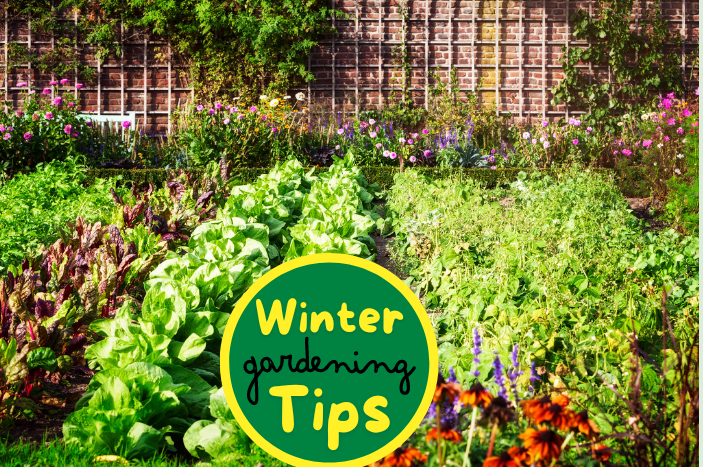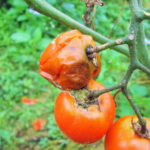With winter just around the corner, it’s time to start preparing your garden for the colder months ahead. From protecting plants to maintaining garden tools, here are 10 essential tips to help you to prepare your gardens for winter season Let’s dive into the steps needed to care for your vegetables, herbs, berry patches, perennials, roses, trees, and shrubs during the winter season!
Harvest and Store Vegetables
- Tender Vegetables: These vegetables, like tomatoes, zucchini, peas, beans, squash, and pumpkins, cannot survive frost and should harvest before the first freeze. Remove these plants and all crop debris. If any plants are diseased, burn them or dispose of them in the trash. Avoid adding infected plants to compost piles.
- Hardy Vegetables: Vegetables such as Brussels sprouts, kale, collards, broccoli, and spinach can tolerate heavy frost (around 25° to 28°F) and often taste better after a light frost. They can remain in the ground and survive winter without extra protection. Garlic should be planted in late fall to be harvested the following summer.
- Semi-Hardy Vegetables: These can handle light frosts (between 29° to 32°F) but may benefit from some protection, like a cold frame or row cover. Vegetables like cabbage, Swiss chard, arugula, leeks, mustard greens, and kohlrabi may require extra care during harsh winters. Root crops such as carrots, turnips, beets, and parsnips can stay in the ground after frost but should be dug up before the soil freezes. Potatoes also need to be harvested and stored in a warm, dry place for their skins to toughen for winter storage.
Note: Properly store harvested vegetables, using guides for specific crops like onions and carrots. Consider canning or pickling to preserve your harvest. Herbs can be dried or frozen for future use.
Winterize Your Herbs
Herbs have varying degrees of hardiness and may require different winter preparations:
- Sage: Typically a hardy perennial that doesn’t need special winter care.
- Rosemary: A tender evergreen that needs protection in colder zones or should be brought indoors.
- Thyme: Hardy and will go dormant, returning in spring.
- Parsley: Can withstand light frost but needs covering in colder zones.
- Chives: Hardy and can be potted and brought indoors after freezing.
- Basil: A tender annual that needs to be brought indoors to survive winter.
- Oregano: Moderately hardy, benefits from a straw mulch layer.
Cover Your Garden Beds
Add compost to your garden beds in late fall to allow the soil to absorb nutrients over the winter. Consider mulching with straw or covering with black plastic to prevent soil erosion and weed growth. Planting cover crops like winter rye can also improve soil health.
Prepare Berry Patches
Berries are generally hardy, but they may require some pruning and care:
- Raspberries: Prune summer-bearing varieties and cut fall-bearing ones to the ground after they fruit.
- Blackberries: Plant in fall and mound soil around the canes.
- Blueberries: Benefit from a thin mulch layer around their base.
- Strawberries: Cover beds with a layer of straw mulch.
Get Perennials Ready for Winter
Water perennials and flowering shrubs well in the fall. Cut back certain perennials in the spring, especially those with seed heads, like coneflowers. However, prune plants prone to disease, such as bee balm, phlox, and hostas, in the fall. For new flower beds, cover the area now to prevent weeds from emerging in the spring.
Winterize Your Roses
Continue watering roses in the fall but stop fertilizing about six weeks before the first expected frost. After the first frost, mulch around the base to protect the roots. For areas with severe winters, consider building a protective barrier around low-growing roses or laying down long canes of climbing roses and covering them with pine branches or mulch.
Protect Trees and Shrubs
Avoid pruning trees and shrubs in the fall to prevent them from being vulnerable to cold weather. If heavy snow is expected, protect small trees and shrubs with a wooden structure or wrap them in burlap. For young fruit trees, wrap the trunk with a pest-proof cover to protect from winter damage.
Turn Off and Drain Water Systems
Before the first frost, turn off your watering systems and drain hoses to prevent freezing and cracking. In colder climates, use an air compressor to blow out any remaining water from sprinkler systems or bring hoses inside.
Support Your Garden Helpers
Keep bird feeders stocked with high-energy foods like suet to help birds through the winter. Maintain a regular feeding schedule, provide fresh water, and clean feeders regularly to ensure a healthy environment for birds.
General Garden Maintenance
- Containers: Empty and store containers upside down to prevent cracking.
- Tools: Clean and store gardening tools to prevent rust. Some gardeners oil their tools with vegetable oil for added protection.
- Compost: Cover your compost pile with a layer of straw or plastic before the first snow.
- Lawn Care: Mow the lawn one last time before winter and remove leaves to prevent damage to the grass.


